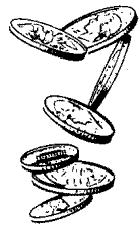Check this out here:
http://www.snopes.com/language/acronyms/tip.htm
Origins: Once again our lust for
interesting backstories to everyday words has led many to believe that 'tip' (used in the sense of a gratuity) came into the English language as an acronym, a word formed by combining the initial letters of a name or series of words. Disappointingly, there were no 'TIPS'-labelled boxes into which thirsty pub patrons of centuries past stuffed their offerings in efforts to keep the libations flowing -- 'tip' entered our lexicon in much more mundane fashion. We've yet to find an acronym that predates the 20th century, and 'tip' (used in the sense of a gratuity) is much older than that.
'Tip' as an acronym appears to have three primary "explanations," none of them valid:
- To Insure Promptness
- To Insure Performance
- To Insure Prompt Service
Each of the "explanations" is long on fanciful theory and short on practicality. Although handing over a gratuity prior to the act might inspire the one receiving the largesse to provide a higher level of service, there is nothing "insured" about the transaction. (Actually, that should more properly be "ensured," not "insured," but those who make up false etymologies are seldom troubled by small details, especially ones that would transform 'tips' into 'teps.') A waiter generously pre-greased is just as capable of delivering poor service as one who is not tipped until the meal has been served and cleared and the bill presented. Indeed, tipping up front might well prove counterproductive in that the provision of the palm oil before the act removes a substantial portion of the incentive to perform admirably. The money's already being in the pocket, so to speak, lessens the server's interest in making sure that all goes well.
Some maintain that a tip is not furnished ahead of time, so the above explication does not 'disprove' the acronymic claim. In that case one once again has to wonder where the 'insure' part of the false etymologies comes from, since the act being recognized with a gratuity has already been carried out. The service was either good or it wasn't; no gratuity, no matter how large, enables anyone to go back into time and 'insure' that whatever has already taken place will be satisfactory.
'Tip' is an old word, and it has nothing to do with either acronyms or the act of attempting to influence quality of service. Although the word has many meanings, both as a verb and as a noun, the use of the term as it applies to monetary rewards to servants dates to the 1700s. It first appeared in this context as a verb ("Then I, Sir, tips me the Verger with half a Crown" from the 1706 George Farquhar play
The Beaux Stratagem) and was first recorded as a noun in 1755. However, the use of 'tip' to describe the act of giving something to another (where that list of possible 'somethings' could include small sums of money, intelligence on horse races, or the latest silly joke) goes back to 1610. 'Tip' slipped into the language as underworld slang, with the verb 'to tip' (meaning 'to give to or share with') being used by shady characters as part of the then-current argot of petty criminals. Nowadays this use of 'tip' has become entirely respectable, but it is amusing that the usage began its linguistic life as tough guy jargon. One wonders if future generations will similarly discover that some of their everyday terms sprang from scenes in
The Godfather or were first voiced in episodes of
The Sopranos.
******************************

Barbara

 )
)
 ). As a matter of fact I could pretty much guarantee you that if I were a waiter I would not declare all of my tips. I would try to get away with as much as I could. What I am saying though is if their boss came to them tomorrow and said we are doing away with tipping and instead raising your salary then I do not think a valid argument would be that they are upset because before they were able to make more money when they did not declare everything they were supposed to.
). As a matter of fact I could pretty much guarantee you that if I were a waiter I would not declare all of my tips. I would try to get away with as much as I could. What I am saying though is if their boss came to them tomorrow and said we are doing away with tipping and instead raising your salary then I do not think a valid argument would be that they are upset because before they were able to make more money when they did not declare everything they were supposed to. .
. 